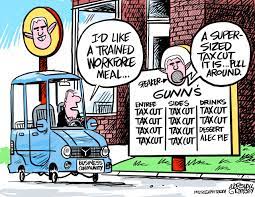
2.16.22 – Mississippi Today
While the state legislative leadership is consumed with cutting or eliminating the income tax, state business leaders consider lack of skilled workers, Mississippi’s image and problems from the pandemic far more pressing issues.
“… The Mississippi tax environment was not high profile nor even discussed significantly as a priority,” said a report released by the Mississippi Economic Council at the state Capitol on Wednesday, based on dozens of meetings and hundreds of surveys of business leaders across the state last year. “… A businessman raised the topic (at one meeting) and dismissed it as a bad idea (a distraction issue, but not really a hindrance to most businesses).”
MEC released the report, “Securing Mississippi’s Future,” on Wednesday after it held 51 town-hall style forums with business and community leaders across the state and from numerous sectors from July through September of last year. The income tax issue didn’t even come up at any meeting until the end of August, the report said.
“There was the thought (eliminating the income tax) could drive other costs up and it could hurt the state budget and households,” the report said.
But state lawmakers at the Capitol have been focused on cutting or eliminating the state’s income tax, and the House and Senate’s Republican leaders have been battling over competing plans. The House wants a massive tax overhaul that would include elimination of the state income tax over about a decade, and an increase in sales taxes. The Senate has a more modest plan of small income tax cuts over four years.
This isn’t the first time business leaders have thrown cold water on the legislative income tax cut push. In summer hearings, MEC’s president told lawmakers it was not a top business priority, but some fear it could have unintended consequences. Other representatives of industry sectors voiced concern or opposition at the time.
The top issues “far and away” among state business leaders, the new MEC report said, were lack of workers, Mississippi’s image — and need for marketing the state better and stopping “brain drain” — and problems caused by the pandemic. The report noted that the meetings and surveys were during a spike in COVID-19 cases, likely contributing to that issue’s high ranking.
“In every community — without exception — the number-one issue was identified as ‘lack of qualified workers,’” the MEC report said. “… The number-one issue facing growth in Mississippi can be summed up easily: There are not enough qualified workers for current jobs, and even those willing to enter the workforce are not prepared for the task at hand.”
Lt. Gov. Delbert Hosemann and House Speaker Philip Gunn attended a Capitol press conference Wednesday where MEC announced its report and subsequent “Goals for Charting a Bold Course for Mississippi.”
Gunn, who has said eliminating the state income tax is the greatest priority of his political career, did not mention that effort, but said lawmakers have been focused on improving workforce development. He said that last summer, he met with a national “site selector” who helps businesses choose where to locate, and asked him what he looks for in selection.
“He said number one is workforce — a qualified, educated, reliable and trained workforce,” Gunn said.
Hosemann, who has been more cautious about tax cuts and reluctant to eliminate the income tax as Gunn proposes, said, “The best workforce development we have is an educated child.”
Leaders across the state said there is a lack of skills among Mississippi’s graduates and better collaboration is needed between businesses, high schools and post-secondary schools. Those surveyed by MEC strongly supported financial incentives for keeping Mississippi high school and college graduates in state.
Broadband expansion and improvement of road and bridge infrastructure were topics that came up frequently with business leaders, the report said.
The MEC report also said that, except for those working for hospitals, medical centers and nursing homes, Medicaid expansion “received surprisingly little attention” as a topic among business leaders. Although the report said, “There was unanimous agreement that healthcare is 100% a workforce issue.”
Those pushing Medicaid expansion in Mississippi had hoped MEC and its business leaders would join in the push for expansion. Last year, MEC President Scott Waller said he expected MEC to take a position on Medicaid expansion and make policy recommendations before the 2022 legislative session that began in January.
On Wednesday, Waller said access to health care is still an issue with the business community, but right now MEC’s focus would be “working on ways to better access care with the system we have now.”
— Article credit to Geoff Pender of Mississippi Today —
